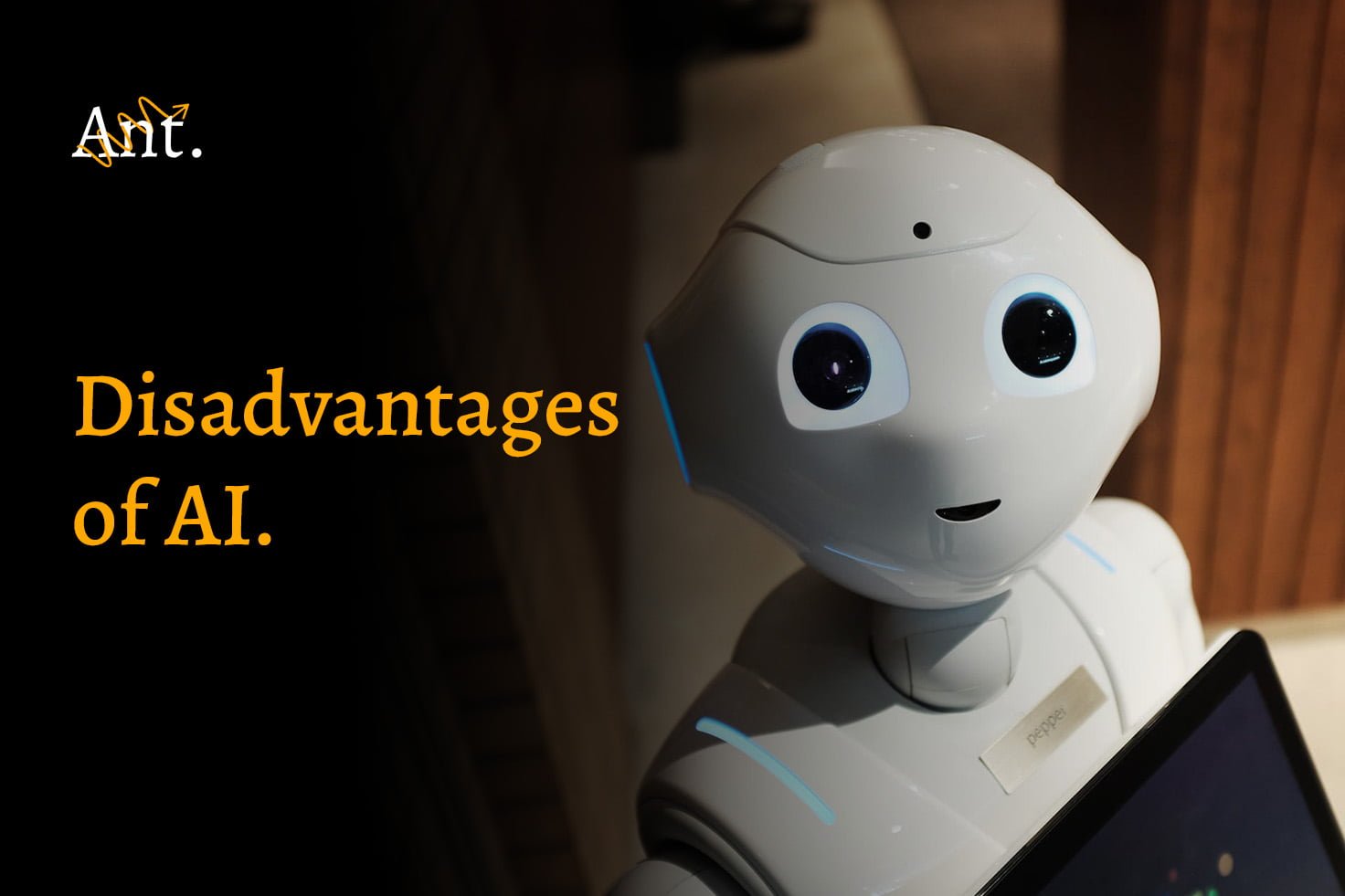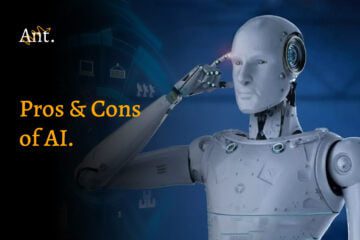AI has become a big part of our daily lives, you know? It’s everywhere, from our smartphones to the cars we drive, and even how businesses run.
A report from Stanford University says that AI tools have grown 14 times from 2000 to 2018. That’s a crazy-fast integration of this tech into our lives! But hey, while AI has tons of benefits, we shouldn’t ignore the potential disadvantages of AI in our day-to-day lives, you know?

We’re increasingly dependent on AI, which raises some valid concerns. Privacy threats, job displacement, relying excessively on technology, ethical issues, and even the impact on mental health.
Table of Contents
As we enter 2024, AI remains a game-changer in our everyday lives. It’s got its perks, no doubt, but there are also some concerns we should ponder.
Major Disadvantages of AI in our daily life
Let’s dive into these 14 major Disadvantages of AI in our day to day life:
Lacking creativity
First off, AI lacks creativity. It’s based on algorithms and can’t produce truly original ideas, unlike the human mind which is a fountain of creativity. Plus, AI’s prevalence may lead to unemployment. Automation threatens 14% of our jobs over the next few decades according to the OECD.
AI is expensive to implement
AI can also be quite expensive to implement — developing, maintaining, and repairing AI technologies can cost a bomb.
Being emotionless
Another downside is AI being emotionless. AI lacks the human touch, empathy, and emotion critical in certain fields like healthcare, counseling, and customer service.
Bias
AI systems also come with their own biases, as they’re designed by humans who have inherent biases. Plus, they lack the self-awareness to improve or correct these biases.
Making humans lazy
On top of this, AI can make us lazy! With AI doing all the heavy lifting, are we losing our ability to think critically and solve problems?
Algorithms developments concerns
Additionally, there’s the issue of algorithm development concerns. Algorithms are not 100% reliable and errors can have serious consequences, for example, in decision-making processes or autonomous vehicles.
Costly implementation
Costly implementation is another drawback. Large-scale AI applications can be prohibitively expensive for smaller organizations.
Environmental impact
Lastly, the environmental impact of AI is often overlooked. AI systems consume substantial amounts of energy, which contributes to global warming.
The Threat to Privacy
In the digital era, data is like the new gold. AI’s ability to gather and analyze massive amounts of data has definitely been a game changer. But, on the flip side, it has also raised concerns about user privacy. As tech entrepreneur Andrew Lewis famously said, “If you’re not paying for the product, you are the product.” This statement holds especially true when it comes to AI collecting our data.
AI algorithms often rely on a ton of data to work effectively using AI. And, a lot of times, this data is collected from users who may not even realize they’re giving permission to access their personal information. In fact, a survey by the Pew Research Center in 2018 found that 79% of Americans were worried about how their data is being used by companies.
Remember the Cambridge Analytica scandal? It was a big deal, involving unauthorized access and misuse of data from 87 million Facebook users. This incident shed light on the broader implications of data privacy breaches and the potential for manipulation when AI has unrestricted access to personal data.
Job Displacement
AI is increasingly used for everyday tasks, leading to job displacement. Physicist Stephen Hawking noted that machines have already reduced many manufacturing jobs and that middle-class jobs may also be at risk, unless they involve care, creativity, or supervision.
According to a study by the Brookings Institution, around 36 million Americans are in highly automatable jobs, where machines can perform nearly 70% of tasks. This is particularly concerning for low-skill sectors. Job loss due to AI is not just a future concern; it is happening now.
A report by the World Economic Forum predicts that machines will surpass humans in work within the next five years. These numbers highlight the need to address this issue promptly.
Dependency on Technology
As AI becomes more and more ingrained in our lives, there’s this growing concern that we might be getting too reliant on technology.
Albert Einstein once said, “I’m afraid of the day when technology will surpass our human interaction. The world will have a generation of idiots.”
Now, while that quote might sound a bit grim, it actually brings up an important question: as we rely more on AI, are we at risk of losing our essential human skills and abilities?
A study by Microsoft in 2016 found that the average human attention span is now just eight seconds. That suggests that our constant use of technology might be affecting our ability to focus. And here’s another interesting tidbit: a study published in the Journal of Experimental Social Psychology discovered that people who had their mobile phones in sight, even if they weren’t using them, performed worse on cognitive tasks.
And it’s not just about our attention span. Our reliance on AI also affects our problem-solving skills. Take GPS technology, for example. It’s super handy, but it also means that we’re not as good at navigating without it. A report from the University of Tokyo revealed that people who use GPS have less activity in the hippocampus, which is the part of the brain involved in memory and navigation. So, as we continue to integrate AI into our daily lives, it’s worth considering the potential impact it could have on our cognitive abilities.
Ethical Concerns
AI’s super-fast evolution and integration into different aspects of society have brought up some ethical dilemmas. These concerns mainly revolve around transparency, privacy, bias, and accountability.
Elon Musk, the CEO of SpaceX and Tesla, gave a spooky warning, saying,
“We’re basically summoning the demon with artificial intelligence.”
One pressing concern is algorithmic bias. AI systems learn from the data they’re fed, and if that data is biased, well, you guessed it, the AI will be biased too. For example, a risk assessment software used in criminal sentencing was found to be biased against African Americans, according to a study by ProPublica.
The lack of transparency or the mysterious “black box” nature of AI is another biggie. Figuring out how a particular AI system comes to its conclusions can be a real headache, especially for decision-making in healthcare, finance, and law.
As Kate Crawford, a top academic on the social effects of AI, puts it,
“We should always be skeptical when machine learning systems claim to be bias-free if they’re trained on human-generated data. Our biases are embedded in that training data.”
Lastly, we’ve got concerns about accountability when AI systems cause harm. Who’s to blame – the creator, the user, or even the AI itself? That’s a question that’s still up in the air. As we go forward, it’s crucial to address these ethical challenges and handle them responsibly in the development and use of AI.
Read More: Why is AI bad for Students?
The Digital Divide
The rapid progress of AI technology has led to a significant disparity in access, commonly referred to as the “digital divide.” This division separates those who have access to technology and the internet and those who do not.
Bill Gates, co-founder of Microsoft, once said, “The internet is becoming the town square for the global village of tomorrow.”
According to a report by the International Telecommunication Union (ITU), about 46% of the world’s population remains offline. The World Economic Forum also highlights that in 2020, 3.7 billion people had no access to the internet, marking a stark digital divide.
In the context of AI, this divide is even more pronounced. A 2018 report by the World Intellectual Property Organization found that 25 multinational companies held 50% of all AI patents. This concentration of AI capabilities in the hands of a few corporations and highly developed countries risks widening the digital divide and exacerbating global inequalities.
In a world where AI is reshaping industries and dictating job opportunities, this lack of access is particularly concerning. As we move forward, it is essential to consider how we can democratize access to AI technologies and ensure that their benefits are distributed more equitably.
AI and Mental Health
As AI becomes more common in our daily lives, it’s starting to affect how we feel mentally. This is especially true when we socialize, with AI like social media algorithms and chatbots changing how we interact. A study from 2019 found that 20% of people felt more alone because of how they used social media. While AI can offer personalized experiences and make things more convenient, it can also make people feel anxious and depressed by creating unrealistic expectations.
A UK survey found that Facebook, Instagram, Snapchat, Twitter, and YouTube all harm the mental health of young people. They contribute to feelings of anxiety, depression, loneliness, poor body image, and bad sleep. The constant need for comparison and instant reward, driven by these platforms, can also lower self-esteem and make people feel more alone.
Last Words
As AI becomes more common, it brings both good and bad things that we need to deal with. We’ve talked about the dangers like losing jobs, relying too much on it, problems with fairness and privacy, the gap between people who can use digital tools and those who can’t, and how it affects our mental health. These issues show why we need to work hard to handle these problems and make sure AI is used in a safe and responsible way.
So, while AI might be the buzzword of the century, it’s important to consider these disadvantages and work towards mitigating them.
FAQs
What are the disadvantages of AI?
AI can sometimes make mistakes, and if we rely on it too much, it could cause problems. Plus, it might replace some jobs, making people unemployed.
What are the 3 dangers of AI?
First, AI can make errors that humans wouldn’t. Second, it could be used in ways that invade our privacy. Third, it might create a gap between those who understand AI and those who don’t.
What are the disadvantages of AI on the environment?
AI can have negative effects on the environment. Some of the disadvantages include increased energy consumption, electronic waste from outdated hardware, and potential job displacement.
What is the disadvantage of AI in students?
AI might make students rely on it too much for learning, which could hinder their ability to think critically and solve problems on their own.
How does AI affect your everyday life?
AI makes many things in our life easier. It’s in our phones helping us find places, in our homes controlling smart devices, and even in our online shopping, suggesting what we might like to buy. But, it’s important to remember to use it wisely.


